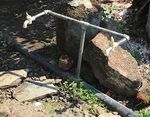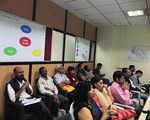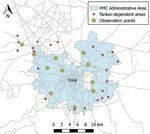FUSE - Pune Activities Update - Food Water Energy for Urban ...
←
→
Page content transcription
If your browser does not render page correctly, please read the page content below
FUSE – Pune Activities Update
February, 2020
Introduction
The FUSE project is addressing Food-Water-Energy potential policy solutions. This document presents a
challenges and solutions, with a major focus on the short overview of data collection activities, fieldwork
Pune, India region. A series of workshops took place in and a workshop undertaken by FUSE members in
February 2019, where stakeholders and policy experts January 2020 in the Pune region.
shared visions, challenges, coping strategies, and
FUSE in a nutshell
FUSE (Food-water-energy for Urban Sustainable Environments) is a transdisciplinary research project involving
the Food-Water-Energy nexus in Pune (India). The project will develop a long-term systems model that can
be used to identify viable paths to sustainability. It brings together natural and social scientists from Stanford
University in California, USA, IIASA (International Institute for Applied Systems Analysis) in Laxenburg, Austria,
UFZ (Helmholtz Centre for Environmental Research) in Leipzig, Germany, and ÖFSE (Austrian Foundation
for Development Research) in Vienna, Austria. The project is a not-for-profit research effort and is part of the
Sustainable Urbanisation Global Initiative of JPI Urban Europe and the Belmont Forum. Each of the national
teams is supported individually by its own national science funding agency.
More information: https://fuse.stanford.edu/
Contact: Prof. Steven Gorelick (Stanford University): gorelick@stanford.edu (Project Coordination)
Ines Omann / Karin Küblböck (ÖFSE): k.kueblboeck@oefse.at (Stakeholder Participation)
FUSE – the second year Integrated Model Development: With the encourage-
ment and assistance of the World Bank and the Water
The FUSE project is now approaching the end of its Resources Department in Maharashtra as well as help
second year. We are delighted to have made important, from other organizations, we have made inroads into
enduring connections with stakeholders, experts, and obtaining data needed to build a model that enables
modelers with whom we engaged in 2018 and 2019. evaluation of sustainable water-food-energy policies
Our team of natural and social scientists has been over the next several decades. This model will include
actively engaged in understanding the intricacies a hydrologic simulation component that will be used to
of the food-water-energy system in the Pune region explore the status of freshwater resources in the re-
and the surrounding Bhima basin in Maharashtra. gion. It will also include an agriculture component used
There have been two distinct thrusts of our efforts: a to quantify crop production and water use. In the future,
focus on the water and food sectors, and developing we expect that there will be significant changes in land
an in-depth understanding of water, food and energy use and climate. For land use, we are developing a
access and provision in Pune, with particular attention sequence of maps that represent projections reflecting
to slums. Among other things, this recently obtained demographic changes and that are consistent with
information enables us to understand resource access historical patterns of land-use evolution. For climate
and quantify water demand relationships for different change, we are building high spatial resolution projec-
categories of urban consumers. tions of temperature and precipitation based on a suite
of climate models that cover the likely range of climate
outcomes and uncertainty about the future.
FUSE – Pune Activities Update 1Food-water-energy Access and Provision: We to communicate and from whom certain data could
have initiated a large data-collection effort aimed at be obtained. The team found that the offices kindly
understanding how residents in the city, particularly offered their time and thoughts and shared additional
in the slum areas, obtain vital resources. Here we data needed for model development.
have collaborated with different partner institutions
in Pune to conduct surveys and interviews. These Household Interviews
included collecting questionnaire data and conducting
FUSE member Yuanzao Zhu (UFZ), cooperated with
in-depth interviews on the frequency of water supply
Dr Vishal Gaikwad and his team at the Gokhale Institute
and households capacity to store water. In addition,
of Politics and Economics to conduct a quantitative
we attempted to better understand the water tanker
survey on household water-energy-food consumption
market by talking with tanker businesses.
in the Pune Metropolitan Region and the surrounding
area. The objectives are to collect: 1) quantitative
Field visit and Workshop: During a visit to Pune
data from different types of households on their daily
several members of our team collected further data,
water, energy and food use as well as socio-economic
supervised a large-scale household survey, and
and socio-demographic characteristics for household
conducted numerous interviews with consumers.
food-water-energy (FWE) nexus resource demand
Our team also held a workshop on January 28, 2020
function estimation, and 2) qualitative information on
organised by ÖFSE in cooperation with the Centre
household FWE nexus resource use, which is valuable
for Environment Education (CEE). There were 40
to improve our understanding of consumer behaviour.
workshop participants and presentations by the FUSE
Comprehensive questionnaires were developed for
team and Advanced Center for Water Resources
individual households and for the housing society or
Development and Management (ACWADAM). In
township manager. In all, 40 students from Pune-area
addition to informing the participants about our
colleges with economics background underwent a
progress, we received valuable feedback and
week of training aimed at carrying out in total 2000
suggestions for improvement and ideas on how to
anonymous door-to-door interviews with slum, formal
better transfer our results to the user community.
urban, township and peri-urban households.
2020 Visit, Activities and Pune One aspect of the trip that affected us came from
Workshop
feedback we obtained in a certain area where people
receive very limited piped water supply (e.g., a
Meeting Stakeholders to Fill Data Gaps few hours every two days). Surprisingly, they were
optimistic and said that this would still be enough for
The visit to Pune in January 2020 offered a rewarding their daily use with the help of water storage. Some
opportunity to continue to learn more about water people monitored their own water use for activities
management and agriculture in the Bhima basin. The such as dish washing, room cleaning and laundry by
interactions and challenges of water distribution among using buckets. This highlighted their desire to efficiently
domestic, industrial, and agricultural sectors in the use their limited water resources. We also learned
context of increasing demand and competition were from local experts in Pune that, in their opinion, the
again clear. FUSE members Dr Anjuli Jain Figueroa consumption information from the water bills in Pimpri-
(Stanford University) and Dr Mikhail Smilovic (IIASA) Chinchwad lacks credibility.
were able to share the progress of the integrated FUSE
model including the hydrological model (CWatM) with Water Collection and Use in Slum Areas
different government and water management offices.
They received generally positive feedback, as well In cooperation with the Pune-based NGO Maharashtra
as questions and suggestions to move forward. With Social Housing and Action League (MASHAL), Heinrich
a better understanding of the different institutions Zozmann (UFZ) conducted in-depth, qualitative
involved in water management, they were more interviews about water collection, storage and use with
able to identify the appropriate offices with whom residents of four slum areas. In a second step, these
households and others filled out water diaries for one
FUSE – Pune Activities Update 2week, documenting the timing and duration of water
collection, along with the activities for which water is
used in their households. Preliminary results from this
field study indicate that there are strong differences in
access to water in slums, depending on the timing of
supply, the water pressure and how many people share
a connection. Typically, female household members
are in charge of water collection, and expend varying
levels of time and effort to make water available to
their families.
Figure 1: Overview of water tanker-dependent areas and
observation points in our recent field study
Community tap and water storage equipment in Ram Nagar, Interviews: Rural-Urban Migration and
Pune Vulnerability in Slums
FUSE member Raphael Karutz (UFZ) conducted
Tanker Water Markets: Structured Interviews semi-structured interviews with slum residents who
and Volumetric Assessment had migrated to the city from rural areas. The aim was
to deepen our understanding of migration trajectories,
In addition, Heinrich explored available information on focusing on the relevance of food-water-energy
tanker water markets in Pune, with a particular focus challenges as drivers.
on how these businesses operate. This information will
be used in FUSE to understand the ways in which tank- One point that came up in several interviews was the
er water operations contribute to water supply and for inter-generational advance in formal education. Many
which areas and water users this supply is most rele- of the people that Raphael interviewed were illiterate,
vant. To this end, Heinrich cooperated with the Samidha because they grew up in villages without the chance to
Foundation to conduct 20 structured interviews with go to school. However, their children and in some cases
tanker water business owners and truck drivers. To their grandchildren, not only went to primary school but
derive a rough quantitative estimate of tanker water additionally went to secondary school and even went
volumes in Pune, he implemented a monitoring study to college. One mother who had to work on the farm
during which students from the Gokhale Institute count- since early childhood and had no formal education at all
ed water tankers at 11 strategic observation points in told us proudly that her son had just obtained his MBA.
Pune for three consecutive days. This is an impressive example of how people use the
new opportunities offered by moving to a city. This
appears to apply to those moving to slums as well.
FUSE – Pune Activities Update 3FUSE-Workshop on January 28
The January 28, 2020 FUSE-Update Workshop was
intended to present the beginnings of the integrated FUSE
Nexus model, in which the information and input from the
workshops in February 2019 are being incorporated. This
workshop was organised by ÖFSE in cooperation with the
Centre for Environment Education (CEE) and facilitated
by its program director Sanskrit Menon. The combination
of presentations by FUSE and ACWADAM met with great
interest. About 40 participants from research, policy and
civil society attended the workshop.
Figure 2: Location of interviews carried out during the field visit The FUSE team presented some first insights and findings,
with a focus on the relation of the food-water-energy
nexus to urban growth and on hydrologic assessment and
modelling. The conceptualization of the model was the
basis for discussion and attracted many questions, insights
and suggestions for improvement.
Of interest were questions about the inclusion of legislation
and reservoir operation practices, flood risk and green
spaces, and leakages in pipes and canals. Although we
cannot include erosion and sedimentation of dams, we
have a valuable data set shared by the Basin Simulation
Office and National Hydrologic Project to help us calibrate
the flows from reservoirs. Green infrastructure and other
policy options will be included via scenarios, which include
a business as usual scenario that extrapolates current
practices. Importantly, we heard the suggestion to avoid
one-way (“silo”) thinking and to make sure we include
reasonable leakage that accounts for the impact of
groundwater-canal flow interactions. This of course raised
a question about data since the estimates for leakage are
not well-documented.
The FUSE team sought the help of participants to fill data
gaps. Many of the hydrology data gaps were filled by the
strong support of the Water Resources Department and
associated offices including the Pune Irrigation Circle,
National Hydrologic Project, and Basin Simulation Office.
Our partnership with the Gokhale Institute helped improve
Impressions of field work our understanding of the agricultural data. We still aim to
strengthen our understanding of urban water.
FUSE – Pune Activities Update 4Dr. Himanshu Kulkarni’s presentation on the results of ACWADAM’s Pune aquifer mapping met with great interest and certainly made an impression, which was evident when we asked participants to rank some of the most pressing food-water-energy challenges and unregulated groundwater abstraction rose to the forefront. This is great feedback, since we plan and have capacity to include this in our integrated model. Finally, we received advice regarding engagement of students and ensuring that the model can be used by programmers as well as non-programmers. The FUSE team is open to partners and students that may be interested in experience with a large international proj- ect. Furthermore, we will aim to clearly communicate our insights and results. We are exploring possible ways to enhance the capacity building element of the FUSE project to support the transfer of our integrated model to water managers and planners, among others. Impressions of the workshop Figure 3: Conceptualization of the FUSE model FUSE – Pune Activities Update 5
Some General Data Needs
Urban Agricultural Water
■■ Actual urban water and energy use spati- ■■ Observed land use (crop specific and in ■■ Ujjani inflow for recent years
ally by sector and time time, months) ■■ Water audit spreadsheets for more years
■■ Focus on historical time series by spatial ■■ Observed crop yield (Production and Area) ■■ Water allocation rules among crops or within
units ■■ Crop prices at higher resolution than state ag
■■ Aggregate water use by cities (PMC, ■■ Production Costs (spatial or higher resolu- ■■ Annual water withdrawals
PCMC, PMRDA, MIDC) tion than state) ■■ Monthly water supplies
■■ Piped distribution network map ■■ land costs ■■ Reservoir operating rules
■■ Water and energy supply system capa- ■■ input costs (labor, ■■ IMD Soil Moisture and Evapotranspiration
cities and supply duration by ward or ■■ Water costs (surface water and ground-
distribution zone ■■ Evaporation station locations
water)
■■ Big consumers and changes in use ■■ 38 gauge River Discharge Daily 1980-2019*
■■ Irrigation water used (amount and source)
■■ Urban flood information ■■ 55 Reservoir Daily Inflow, Level, Storage,
■■ Historical drought information Discharge from Flood Control Cell Sheets*
■■ Water Accounting Sheets for missing 44
Reservoirs and longer time for all*
■■ Reservoir Top bottom and Crest*
■■ Irrigation water use
■■ Ground level and pumping*
■■ Flood Control Levels (FCL)*
* Some obtained previously, need missing
years/locations to fill data gaps
Figure 4: Data needs presented by the FUSE team during the workshop
Imprint: ÖFSE, Sensengasse 3, 1090 Vienna, Austria. Authors: Steven Gorelick, Anjuli Jain Figueroa (Stanford University);
Mikhail Smilovic (IIASA); Raphael Karutz, Yuanzao Zhu, Heinrich Zozmann (UFZ); Karin Küblböck, Ines Omann (ÖFSE).
© Photos: Anjuli Jain Figueroa, Raphael Karutz, Heinrich Zozmann. Design: Alexandra Erös, ÖFSE
The FUSE team would like to thank all partners in Pune for their valuable contributions.This work was conducted as part of
the Belmont Forum Sustainable Urbanisation Global Initiative (SUGI) Food-Water-Energy Nexus theme for which coordination
was supported by the US National Science Foundation under grant ICER/EAR-1829999 to Stanford University. The Austrian
partners ÖFSE and IIASA are funded by the Austrian Research Promotion Agency (FFG). UFZ receives funding from the
Federal Ministry of Education and Research (BMBF). Any opinions, findings, and conclusions or recommendations expressed
in this material do not necessarily reflect the views of the funding organizations.
FUSE – Pune Activities Update 6You can also read



























































